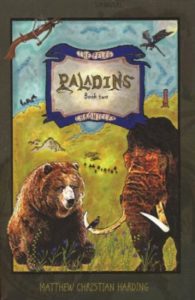 Each of your characters were so well drawn out in the series, I felt as though I knew each of them. In three words what is this book about?
Each of your characters were so well drawn out in the series, I felt as though I knew each of them. In three words what is this book about?
Matthew: One of my readers summed it up once in three words so I’ll go with what they said. “Giants … Dragons … Faith!!”
Excellent choices to get a reader’s attention. When you write do you outline the entire book before starting, or do you write as you go and let the characters take control of the story?
Matthew: I used to write with a really loose outline, like knowing where I was going to begin and where I wanted to end. But for my last two books I’ve written down a pretty substantial outline, but at the same time I’m not afraid to veer from it if it seems like I can still get to the ending I’ve planned.
How do you believe The Peleg Chronicles relate to the lives of readers?
Matthew: People often read these kind of stories because they want to experience the emotional thrill that goes along with the dangers within, yet without actually being physically exposed to any peril. Many of my readers are Christians and find that there is a disconnect between the fantastical genres and their God. So I try my best to deliver the excitement they are seeking while at the same time bringing honor and glory to their King of Kings, and beyond that, exhorting them to follow Him.
Expound on the biblical background within the series?
Matthew: The Story line is fiction and all the characters are fictional, though some people from the Bible are mentioned at times. For instance, Noah, Job, Peleg, Mizraim and Japheth are all alive on the earth at the time the story takes place. The nearness of the flood, the Tower of Babel, the dispersion, dragons/dinosaurs with man, and giants are all Biblical aspects woven throughout.
Is it difficult to maintain accuracy to a biblical perspective or biblical facts when writing fantasy fiction?
Matthew: Yes, I believe it is fraught with dangers, but it is an area that truly beckons to our young people. I find it fascinating that much of what the world calls fantasy is actually based in God’s truth. The Bible tells us that dragons were on the earth at the same time that man was, and in relatively recent history. It tells us that giants, in fact whole nations of giants were a reality, and that technological advances appear prior to when secular man says they should. So, if we can take these elements and truly line them up with God’s Word I think we’ve got a winning combination to encourage our children towards a closer walk with their God.
How much leeway do you give yourself with facts in a Historical Speculative Fiction story?
Matthew: I actually have quite a bit of leeway when writing in this time period because the details of how all these Biblical and historical aspects came together are vague. We just don’t have much documentation the further back in time we look. A dividing of people groups through the Tower of Babel
dispersion would have caused much culture and technology loss, the extent of which would vary according to the circumstances encountered for each group.
I also took many of the character and place names, and religious and cultural practices from more recent ancient history. A kind of building backwards of historical elements, that were not necessarily part of the time or place brought to life in the Peleg Chronicles, but at least plausible. FF
 Matthew Christian Harding continues to delve into historical speculative fiction with his seres; The Peleg Chronicles for ages 12 to adult. Matthew and his wife, Cassandra homeschool their four children: Meeka, Patience, Charity, and Gentry.
Matthew Christian Harding continues to delve into historical speculative fiction with his seres; The Peleg Chronicles for ages 12 to adult. Matthew and his wife, Cassandra homeschool their four children: Meeka, Patience, Charity, and Gentry.
Contact/Social Links:


